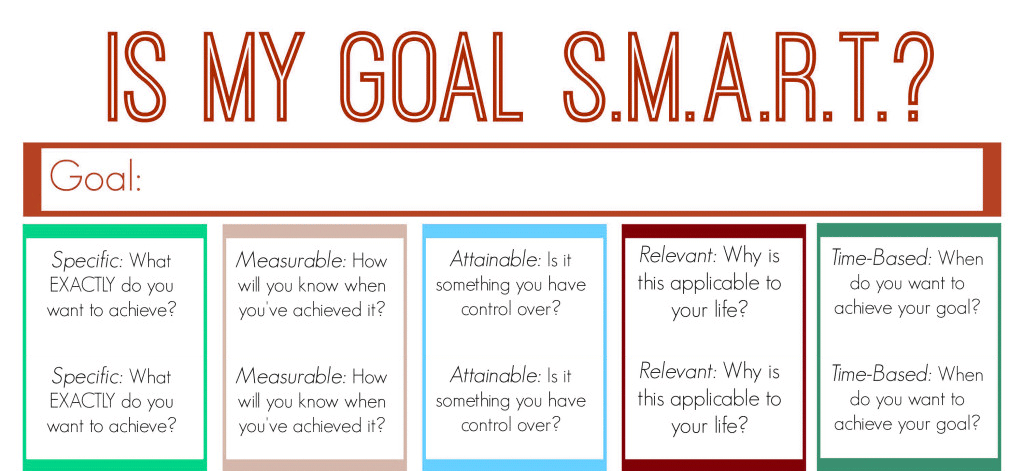Work and School
There are many techniques and practices that have been proven to help students improve their ability to achieve academic success and, on this page, we offer you some suggestions. It is important to recognize that all of these suggestions have been shown to work for many students, but none are effective for all, so we invite you to try them on and see what works for you.
Goal Setting
Students who are successful tend to set goals. Goals should be “SMART”; that is Specific, Measurable, Achievable, Relevant and Timely.
|
This Photo by Unknown Author is licensed under CC BY-NC |

Consider that a goal such as “get accepted into a Master’s program” does not meet this criteria; you cannot really measure your progress towards it and the final decision is out of your control. Instead, try setting a goal of achieving an overall average of 80% (or whatever is comfortable for you) in your current program. This goal would meet SMART criteria. For more information on setting goals, check out this resource: SMART goals for college students
When you find yourself overwhelmed by your workload, remember Rubin’s vase (link back to Mindfulness page). You may notice that you are focused on the seemingly endless readings, essays and practicum requirements. You may find it difficult to see any perspective beyond the overwhelm. This is where mindfulness practice helps; learn to step back and see the whole picture. Remember why you decided to pursue social work; remind yourself of your purpose. Remember the people you wanted to help and recognize that a year or two from now, you will look back and realize that it was all worth it. If you need help reminding yourself why you chose social work, read this.
Here is another useful tool to help students discover their purpose.
Also, remember what you have accomplished so far. Allow yourself to be proud and know that, looking back, you will be proud of how you handled the current stressors as well.
Get Organized
To-Do Lists: You have a lot to do and not enough time to get it done. Being organized will help. Grab all of your syllabi and make one list, in chronological order, of everything that is due and when. Many studies show that ‘to-do’ lists increase productivity and reduce stress.
There are many free apps and tools to help you create lists and organize your time, but you really don’t need anything more than the Reminders app that comes free on every computer or smartphone. If you want to check out more tools, check out this article and for more information on how to use to do lists, click here.
*Note: there are also studies that show that unfinished items on to-do lists can cause anxiety for some people too, so give it a try and see if it helps. If it causes you anxiety, you can always throw it away.
Time Blocking: Time blocking is another habit of productive people; in your calendar, schedule blocks of time to accomplish certain tasks. You already do this to go to class, so why not block time to do course readings or studying? If you block specific hours to do coursework in advance, you don’t need to constantly make choices about what to focus on. Here is a helpful article on how to effectively time block.
Eliminate distractions
Consider eliminating distractions; turn off your email notifications and your phone while you are studying. Your brain can only process one task at a time and each time you stop concentrating to answer a text message, you need to go through the process of refocusing. Time spent in lectures and studying is much more efficiently spent if you are able to remain focused on the task at hand. Try working in a quiet, distraction free environment and see if your productivity increases. Again, though, there have been studies done where students who studied in distracting environments such as busy coffee shops were compared to students who studied in quiet environments and many students in the distracting environments learned more, so again, try this on and see what works for you. For more information: Eliminating Distractions.
Study Effectively
Many study methods have been designed and studied for effectiveness. These include:
- Practice Testing (frequent testing over time using tools like cue cards)
- Distributed Practice (studying several different topics for short periods rather than focusing on one topic for extended periods)
- Interleaved Practice (alternating topics of study)
- Elaborative Interrogation (attaching explanations of subjects in your own words to increase understanding)
- Rereading (reviewing readings over and over)
- Highlighting and Underlining
And many more. Here is chart that gives some information on the results of studies that have been done.

What is important to remember is that there is more than one way to do things and new techniques may get you better results. For more information on study techniques, click here.
Sprints, Not Marathons
Studies have shown that studying is most effective when done in sprints rather than marathons. Concentrate hard for an hour, then take a break and do something that you enjoy for ten to fifteen minutes. Then get back to work.
And don’t forget to acknowledge all of your hard work. Be aware of not just what you have ahead of you, but what you have already accomplished on this journey. Reward yourself for the progress you have made rather than focusing only on the mountain you still have to climb.
